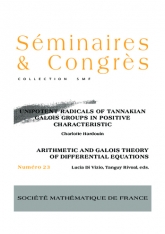Radicaux unipotents de groupes de Galois tannakiens en caractéristique positive
Unipotent radicals of Tannakian Galois groups in positive characteristic
Séminaires et Congrès | 2011

- Consulter un extrait
- Année : 2011
- Tome : 23
- Format : Papier
- Langue de l'ouvrage :
Anglais - Class. Math. : 18D10, 39A, 34M15
- Pages : 283-299
Soit $\mathcal {T} $ une catégorie tannakienne sur un corps $C$ de caractéristique strictement positive. Nous montrons dans cette note comment on peut ramener l'étude du radical unipotent d'un groupe de Galois tannakien d'un objet $\mathcal {U} $, extension de l'objet trivial $\mathbf {1}$ par un objet $\mathcal {Y} $ complétement réductible, à celle du groupe $\operatorname {Ext}^1(\mathbf {1},\mathcal {Y} )$ des es d'isomorphismes d'extensions de $\mathbf {1}$ par $\mathcal {Y} $. Nous déduisons de nôtre théorème que, sous certaines hypothèses, le groupe de Galois tannakien d'une somme directe d'extensions est entièrement déterminé par les relations de dépendance linéaire satisfaites par ces extensions dans $\operatorname {Ext}^1(\mathbf {1},\mathcal {Y} )$. Ce corollaire ramène le calcul des relations algébriques définissant le groupe à une question d'algébre linéaire. Comme application, nous donnons une preuve alternative de l'indépendance algèbrique des logarithmes de Carlitz de M. Papanikolas ([?]).
Catégories tannakiennes, Radical unipotent, Groupes de Galois, $t$-motifs

